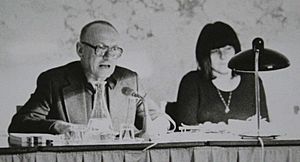Ernst Jandl facts for kids
Ernst Jandl (born August 1, 1925 – died June 9, 2000) was an Austrian writer, poet, and translator. He became famous for his special kind of experimental poetry. This means he played with words and sounds in new and unusual ways. He was especially known for his sound poems, which are poems meant to be heard out loud. These poems were part of a style called concrete poetry and visual poetry, where the way words look on the page or how they sound is just as important as their meaning.
Contents
Playing with Words and Sounds
Ernst Jandl was inspired by a movement called Dadaism, which was an art style that liked to break traditional rules. He started writing experimental poems, and his first ones were published in a magazine called Neue Wege (which means "New Ways") in 1952.
He shared his life with another writer, Friederike Mayröcker. In 1973, he helped start a group for writers called the Grazer Autorenversammlung in Graz. He was the vice president of this group in 1975 and later became its president from 1983 to 1987.
How His Poems Work
Jandl's poems are special because he loved to play with the German language. He often focused on single letters or sounds (called phonemes) to create new meanings or feelings.
For example, one of his most famous poems is "ottos mops" (which means "otto's pug" in English). This poem is unique because it uses only the vowel "o" throughout! Poems like this are very hard to translate into other languages because the wordplay depends on the specific sounds of the original language.
Most of his poems are best experienced when you hear them. Ernst Jandl's readings were always very impressive because of the special way he spoke his poems. A poem like "schtzngrmm" is a great example. This poem is his version of the German word "Schützengraben", which means "trenches" from World War I. You can only understand this poem if you hear it read correctly. It's an experimental poem where he uses combinations of letters that sound like gunshots or exploding missiles, telling the story of war through sounds.
He also translated works by other famous writers and artists, including Gertrude Stein, Robert Creeley's The Island, and John Cage's Silence.
Some of his other well-known poems include "lichtung" (also known as "lechts & rinks", meaning "light & reft") and "kneiernzuck".
Here is a short poem he wrote in English:
i never remember my second wife
i never remember my third wife
i always remember what i always remember
ain't ever even had a first wife
Awards and Recognition
Ernst Jandl received many awards for his writing throughout his life. These awards show how important and respected his work was in the world of literature.
- 1969: Hörspielpreis der Kriegsblinden (with Friederike Mayröcker)
- 1974: Georg-Trakl-Preis
- 1976: Literature Prize of the City of Vienna
- 1978: Austrian Prize for Literature
- 1980: Mülheim Dramatists Prize
- 1982: Anton Wildgans Prize
- 1982: Manuscripts Prize of Styria
- 1984: Georg Büchner Prize
- 1984: Grand Austrian State Prize for Literature
- 1985: Preis der deutschen Schallplattenkritik
- 1986: Gold Medal of Vienna
- 1987: Kassel Literary Prize for Grotesque Humour
- 1988: German Cabaret Award
- 1989: Frankfurt Hörspielpreis
- 1990: Austrian Decoration for Science and Art
- 1990: Peter-Huchel-Preis
- 1993: Kleist Prize
- 1995: Friedrich-Hölderlin-Preis
- 1995: Medal of the Province of Styria
- 1996: Grand Decoration of Honour in Gold for Services to the Republic of Austria
His Works
Here are some of the collections of poems and books Ernst Jandl published:
- "Ottos Mops" (1963)
- "Laut und Luise" (1966)
- "sprechblasen" (1968)
- "der künstliche baum" (1970)
- "idyllen" (1989)
- "Aus dem wirklichen Leben" (1999)
- Reft and Light (2000) - This book was translated into English by various American poets.
Books
- lechts und rinks. gedichte, statements, peppermints (meaning "light and reft. poems, statements, peppermints")
- laut und luise
- Interpretationen, Gedichte von Ernst Jandl (meaning "Interpretations, Poems by Ernst Jandl")
- ernst jandl, aus dem wirklichen Leben: gedichte und prosa (meaning "Ernst Jandl, from real life: poems and prose"), which included 66 drawings by Hans Ticha.
See also
 In Spanish: Ernst Jandl para niños
In Spanish: Ernst Jandl para niños
 | Shirley Ann Jackson |
 | Garett Morgan |
 | J. Ernest Wilkins Jr. |
 | Elijah McCoy |


